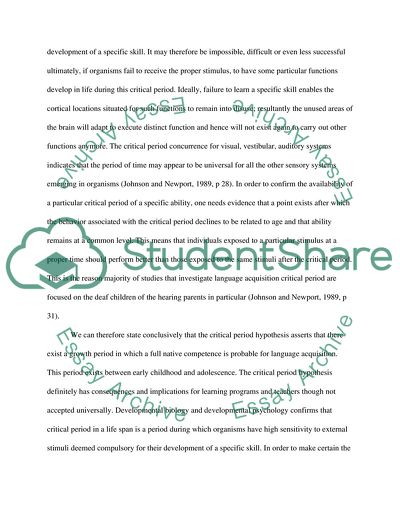Cite this document
(“Critical Period Effects in Second Language Learning Essay”, n.d.)
Critical Period Effects in Second Language Learning Essay. Retrieved from https://studentshare.org/psychology/1612474-examine-the-controversy-surrounding-the-critical-period-hypothesis-what-is-the-evidence-that-there-is-a-critical-period-and-how-has-that-been-used-in-debates-about-the-nature-of-language
Critical Period Effects in Second Language Learning Essay. Retrieved from https://studentshare.org/psychology/1612474-examine-the-controversy-surrounding-the-critical-period-hypothesis-what-is-the-evidence-that-there-is-a-critical-period-and-how-has-that-been-used-in-debates-about-the-nature-of-language
(Critical Period Effects in Second Language Learning Essay)
Critical Period Effects in Second Language Learning Essay. https://studentshare.org/psychology/1612474-examine-the-controversy-surrounding-the-critical-period-hypothesis-what-is-the-evidence-that-there-is-a-critical-period-and-how-has-that-been-used-in-debates-about-the-nature-of-language.
Critical Period Effects in Second Language Learning Essay. https://studentshare.org/psychology/1612474-examine-the-controversy-surrounding-the-critical-period-hypothesis-what-is-the-evidence-that-there-is-a-critical-period-and-how-has-that-been-used-in-debates-about-the-nature-of-language.
“Critical Period Effects in Second Language Learning Essay”, n.d. https://studentshare.org/psychology/1612474-examine-the-controversy-surrounding-the-critical-period-hypothesis-what-is-the-evidence-that-there-is-a-critical-period-and-how-has-that-been-used-in-debates-about-the-nature-of-language.


